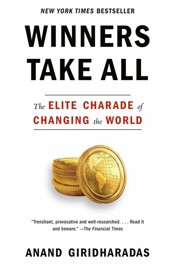Winners Take All: The Elite Charade of Changing the World

Last year, I had lunch with a friend. She is very much on the Left, politically. I mentioned that I thought Bill Gates was a great humanitarian. She responded in a way that unsettled me (I’m paraphrasing).
Sure he gives a way a lot of money, but we really need to examine how the world let someone get that rich in the first place.
This bothered me a little because it flew in the face of the capitalist ethos of individual achievement (of which I am an enthusiastic participant), and it called into question the generosity of one of the richest men in the world.
But I didn’t forget what she said – it was an angle I had never considered before.
That’s basically what this book is about. There’s a peculiar dynamic where the world expects some people to get rich, then for them to “give back” and improve the world. There are problems in the world that we don’t fix at the roots, we just expect the “winners” to have mercy on everyone else and make themselves look like heroes by fixing the problem.
Another key point: they might have caused some of these problems, or at least got very wealthy by exploiting the problems.
For example: a billionaire starts a program to help underprivileged people, and we look at this as an amazingly gracious gesture. But how did the billionaire get that rich in the first place? By exploiting labor? What if the billionaire had just paid their employees more, or fought for higher wages, or done things while they were coming up which helped other people at the time? Wouldn’t that have been more helpful?
Of course, if the billionaire had done that, they might not be a billionaire in the first place. So there’s little incentive for them to help other people at the time. The archetype the world seems to love is someone who gets rich and then helps people from their enlightened position. Since they got rich, they are the winners, so they can now help the rest of us by solving problems.
Taken to its absurd extreme, we’re saying:
Kick my ass until you win, then please take pity on me and come to my rescue.
Punch me in the nose, then expect thanks when you hand me a towel to stop the bleeding.
Now, this is a very broad brush. I know several lovely, wealthy people who got that way while helping people along the way. Also, an extreme position on this says that we can’t reap the reward of anything we do – anything over and above a “reasonable” amount of wealth needs to be redistributed. (Yeah, you can see where this is going…)
But it’s a valid point that we concentrate on fixing the result of crappy systems, rather than fixing the systems themselves. And the only people with the time and resources to fix these systems are often the people who created and exploited the systems in the first place.
Appealing to these people is also fascinating. They tend to look for marketplace solutions, meaning solutions that make them – or someone – lots of money. “Do well by doing good,” is the mantra.
The author calls these people “MarketWorld.” The only solutions that work for them are solutions that work in the marketplace.
(Note that I’m not totally in agreement here. The marketplace – and the potential for profit – is a motivator that gets people moving when their innate altruism might not. This is just human nature and arguing that it’s not right or fair doesn’t change the fact that it’s reality.)
The author also differentiates between “thought leaders” and “critics.” The former is a product of MarketWorld. They promote popular ideas that make people happy, and they do it in a way that guarantees them conference speaking spots and publicity.
Critics are different. They tell the truth, which is often wildly unpopular, so people don’t want to listen to them. They have a tendency to toil away in obscurity – no one wants to listen to what they’re saying because it makes people uncomfortable and is generally a downer that might make people feel guilty.
(The author provides a sad example in Amy Cuddy who I have enjoyed in the past. As it turns out, her public speaking topics are a very watered-down and marketable version of the actual – more depressing – conclusions she has spent her life discovering.)
For a critic to become a thought leader, they need to tone down their points and make them more palatable. No one wants to help unless it makes them feel good, personally.
Clearly, this is an uncomfortable book. It’s calling into question a lot of things that the Western World takes for granted: like capitalism itself. In some places, it’s an implicit rant against things that the United States holds dear.
The book made me think in a way I wasn’t used to, and it’s stuck with me in the week since I read it. I didn’t agree with all of it, but perspective is good.
Book Info
- I have read this book. According to my records, I completed it on .
- A hardcover copy of this book is currently in my home library.